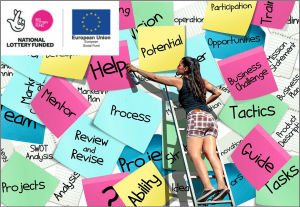As the name suggests, the objective of #Focus5 is to support young people in developing the top five skills identified as crucial to getting into education, employment or training.
We employ experienced key workers across Devon, Somerset, Plymouth and Torbay to work closely with young people between the age of 15-18 years old, who are not in education or employment and engage them in activities that promote these skills.
So what are these skills and why don’t young people already have them?
- Communication
Most employers or higher education organisations will require young people to have ‘good communication skills’ but it is often difficult to pinpoint what that actually means, especially when some communication skills are non-verbal.
Obvious communication skills include; being able to convey information to others clearly and concisely, knowing how much or how little to talk, engaging with other people, understanding instructions, listening effectively, acquiring new skills and asking questions. These are all communication skills that we can see and quantify, but many others are hidden.
Non-verbal communication skills include; making eye contact, understanding the intentions of others, using the right tone of voice, understanding body language and empathising with people, having emotional intelligence and having the confidence to communicate effectively.
Emotional intelligence involves a young person’s ability to be self-aware, to build relationships with others, to manage themselves and their emotions. It could mean the difference between being able to avoid a stressful situation and overcome challenges in the workplace.
Showing confidence can be something as simple as maintaining eye contact during a conversation or using a friendly but firm tone of voice on the telephone. Empathy involves the ability to understand another person’s point of view and respect the views and opinions of others, be they colleagues or customers.
Many of these core and non-verbal communication skills don’t come naturally to young people especially those with social anxiety or social communication difficulties, and #Focus5 helps teach them repeatedly over time.
- Teamwork
Unless a young person is applying for an opportunity where they are not expected to speak to or engage with another person all day, it’s fundamental that they can work as part of a team and show an understanding of teamwork at interviews.
Collaboration skills are applicable in any job even if you work alone. Indeed, outside of the school environment the working world is all about communicating with other people and having good people skills.
Teamwork doesn’t mean everybody doing the same thing or being able to do each other’s jobs, it means a synergised way of working where the sum is greater than the parts. A teamwork environment is motivational, promoting an atmosphere that fosters friendship and loyalty and makes people feel good about the work they are doing.
We all have different skills, qualities, talents, as well as weaknesses and habits, therefore when a team environment is not encouraged or an individual does not feel part of a team, it can spell problems.
If a young person joins a college course, a lack of team working skills may leave them isolated, affecting their results and success. If a young person on the autistic spectrum who finds being in a room with other people quite difficult gets a job in an office, without teamwork skills they may become isolated in the same way.
So whilst teamwork skills may seem obvious and easy to come by, for many young people these are skills that may need to be taught and #Focus5 does this through mentoring, volunteering and other social activities.
- Problem Solving
Problem solving is a skill that applies to the workplace and higher education and whilst everyone is tasked with some form of problem solving in their lives not everyone is good at it.
There is a suggested four step process to problem solving. Firstly defining the problem, then brainstorming alternatives, choosing the best strategy, and implementing a solution. However to do this effectively other skills are needed.
For example young people need strong observational skills, lateral thinking, and analytical abilities to define the problem. As they brainstorm potential solutions to an issue, they need persistence and flexibility. Finding the right approach to the issue might not come easily so innovative thinking and confident decision making is also crucial. Implementing a solution takes other skills such as leadership and teamwork, communication and negotiation.
Unless young people have been actively engaged in collaborative activities at school or at home that demand the development of problem solving skills, it is likely that for much of their lives their parents or teachers will have been the provider of the solutions.
#Focus5 helps with problem solving by discussing issues with young people and empowering them to find their own solutions.
- Customer Service
Customer service or people skills are a top priority for employers and these are all based around communication; the ability to listen, engage, be patient, be positive, empathise with the people around you and read people effectively in person and online.
Young people also need to be able to handle surprises, sense a customer or colleague’s mood and adapt accordingly. They need to be emotionally resilient to accept blame or negative feedback at times and this is a continuous learning process that can’t easily be taught in a school environment.
Listening, patience and empathy are areas which don’t come easily to some young people especially those on the autistic spectrum and they will be at a disadvantage as a result.
Positivity and confident communication might be difficult for young people who are struggling with mental health problems. Other young people might just simply lack experience of operating out in the real world where such skills become a way of life and can be naturally learned.
#Focus5 helps build customer service skills by teaching young people strategies and finding opportunities for them to practice them with others in a professional setting.
- Organisation
Organisational skills allow a young person to arrange their thoughts, their time, and tasks in a structured way and help them avoid making mistakes. Some people by nature are incredibly well organised but others will lack these skills for very valid reasons.
Being organised involves the part of the brain responsible for executive function and self-regulation, which are the mental processes that enable us to plan, focus attention, remember instructions and juggle multiple tasks. Young people with executive functioning issues may struggle in a variety of ways including falling behind at school and having physical development delays.
#Focus5 key workers use strategies that really make a difference to young people’s’ organisation skills. These include; assigning things to their own place, writing ‘To Do’ lists, using visual aids, using online apps such as ‘Brain In Hand’, setting a routine and sticking to it.
Why don’t young people already have these skills?… 
#Focus5 targets the most socially isolated young people across the Heart of the South West LEP. They are either not in education, employment or training (NEET) or they are those most at risk of being NEET. The project also supports vulnerable and isolated young people, such as those who are home educated because of medical referral and those who come from underprivileged backgrounds.
We can consider these young people in the context of the current UK education system which, as Ofsted’s Chief Inspector has confessed, is very focused on exam results. Over time this has narrowed the national curriculum and left very little room for learning life skills or gaining life or vocational work experience outside of the classroom. A British Chambers of Commerce survey found 90% of school leavers were not ready for employment and more than 50% of employers who took part said young people lack basic skills such as communication. The reason for this was put down to a lack of work experience.
When they reach Year 11 ideally armed with GCSE qualifications, young people are expected to automatically transition into further education or employment. Yet with mental health problems on the increase in schools due to exam stress, a narrowed curriculum, increased reliance on social media, bullying and family difficulties and with the special needs funding system in crisis, many young people simply cannot keep up….and they drop out of the system. This is especially true for those diagnosed with a mental health disability or learning difficulties.
Projects like #Focus5 and the soon to be launched Ambitions project in Cornwall and the Isles of Scilly, are designed to intervene with advice and support, nurturing the skills young people need to move towards a brighter future.
#Focus5 is funded by the Building Better Opportunities Fund (BBO) which is jointly funded by the European Social Fund and the National Lottery through the Big Lottery Fund.
For more information please visit the #Focus5 website, refer a young person online, or join our mailing list to receive e-newsletters.



